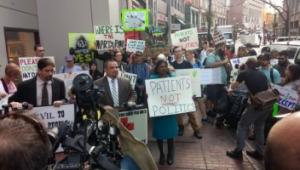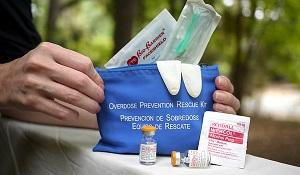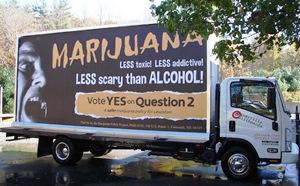Election Day is less than a week away, and it's not just statewide marijuana, medical marijuana, sentencing reform, and drug testing initiatives that we're watching. In five states, voters in some cities or counties will have opportunities to cast ballots for local marijuana reform measures. Here's the rundown.
If you live in a state where drug policy-related initiatives are on the ballot, you don't have to wait until next Tuesday to vote.
A bad court ruling in Arizona, a good court ruling in Michigan, trouble for Florida's Measure 2, actions against dispensaries in California, and more.
New York, San Francisco, and Phoenix all had corrupt cop cases this week. So did East Orange, New Jersey.
Marijuana retailers face ATM problems, Seattle dispensaries get a heads up, the DC initiative wins a pair of endorsements, California's Prop 47 is drawing big bucks support, the Mexico missing student teacher story gets uglier, and more.
James Sensenbrenner is on the asset forfeiture case, Oregon's Measure 91 picks up some big name endorsements, dispensaries get shut down in San Diego and raided by the DEA in LA, fallout continues in the case of the missing Mexican student teachers, and more.
It's nail-biting time for the Alaska and Oregon legalization initiatives, appeals courts in Arizona and Michigan rule on medical marijuana cases, Chuck Schumer (again) wants more money to fight drugs, the acting drug czar opens the harm reduction conference (!), naloxone is coming to Ireland, and more.
The Florida medical marijuana initiative appears to be in trouble, thanks in part to a deep-pocketed GOP opposition donor, a federal court is hearing evidence on marijuana's scheduling, a new report on Colorado's legalization finds less than meets the eye, Russia bans some new synthetics, and more.
There's a scary poll out in Oregon, the Drug Policy Alliance grades the House of Representatives, the ACLU has a petition to stop the Pentagon sending surplus military equipment to police forces, and more.
Cops raise their voices in support of marijuana legalization initiatives, the US government's Afghanistan watchdog slams our drug policies there, Louisiana bans a synthetic cannabinoid and Russia wants to do the same, Britain's Lib Dems and Tories are going at each other over drug policy, and more
Election Day is less than a week away, and it's not just statewide marijuana, medical marijuana, sentencing reform, and drug testing initiatives that we're watching. In five states, voters in some cities or counties will have opportunities to cast ballots for local marijuana reform measures.
In four out of the five states—California being the exception—the local initiatives, some binding, some not, are chances to vote for decriminalizing or legalizing pot. In all of those states, these city- or county-level measures are just the latest steps in sometimes years-long campaigns laying the groundwork for state-level legalization, either through the ballot box or through the legislature.
California is a special case this year. With pot possession already decriminalized, its unique medical marijuana laws providing broad, if uneven, access, and the near certainty that statewide legalization is going to be on the ballot in 2016, nobody is bothering with local legalization measures in 2014 (although they had successful ones in a number of cities in the past).
In California, all the action is about medical marijuana. Let's start there.
California
With the state legislature unable or unwilling to pass statewide medical marijuana regulations, battles on the topic regularly devolve to the local level. This year is no exception. There are three broad areas of contention this year: cultivation, dispensaries, and taxes.
Four counties are dealing with cultivation issues. In Butte County, Measure B is a less restrictive ordinance than Measure A, which was passed by the board of supervisors. Both are on the ballot. In Lake County, Measure O and Measure P, both seek to overturn the restrictive Measure N, which was narrowly approved by voters last year. Measure O would allow more plants to be grown, while Measure P declares that personal—not commercial—grows are a fundamental right and that people growing for their own use are exempt from county cultivation ordinances.
In Nevada County, Measure S would liberalize the county's restrictive cultivation ordinance by allowing indoor cultivation anywhere, eliminating some minimum distance and other restrictions, and allowing up to 60 plants to be grown on plots over 30 acres. In Shasta County, Measure A is a referendum on an ordinance banning outdoor grows and home cultivation. A "no" vote on Measure A would repeal the ordinance.

Medical marijuana remains contested terrain in California. (wikimedia.org)
Dispensaries are on the ballot in a number of cities and counties. In Orange County's Santa Ana, two competing measures are on the ballot.
Measure CC would allow for a minimum of 22 dispensaries, while the more restrictive, city council-sponsored
Measure BB has no minimum number of dispensaries, a higher tax rate, and more restrictions than Measure CC.
In San Diego County, two cities have dispensary measures on the ballot. In Encinitas, Measure F would allow dispensaries and tax them at a 2.5% rate, while in La Mesa, Measure J would do the same thing. In Riverside County, Blythe's Measure Z would authorize and regulate dispensaries, with a 15% business tax.
Straight taxation questions are also on the ballot in Santa Cruz County (Measure K), the city of Santa Cruz (Measure L), Shasta Lake City (Measure C), and two Riverside County communities, Cathedral City (Measure N) and Desert Hot Springs, which has both a cultivation tax measure (Measure HH) and a dispensary tax measure (Measure II) on the ballot.
[Thanks to the Drug Policy Forum of California and its November 2014 Election Guide for the information on California local initiatives.]
Maine
In Maine, the Marijuana Policy Project (MPP) and local allies are sponsoring possession legalization initiatives in two towns, Lewiston and South Portland. A similar effort in York was blocked by recalcitrant town leaders. This year's effort builds on last year's success in Portland, Maine's largest city, where a similar initiative was approved with 67% of the vote.
In Lewiston, the personal legalization initiative is Question 2; it South Portland, it is Citizen-Initiated Ordinance #5.
Lewiston is the state's second largest city, while South Portland is its fourth largest. Victories in those two cities next week, along with last year's victory in Portland, will lay the groundwork for a statewide legalization push in 2016, which MPP says is coming.
Massachusetts
For the last six election cycles, activists with the Drug Policy Forum of Massachusetts and MassCann/NORML have been laying the groundwork for marijuana law reform through the use of non-binding Public Policy Questions (PPQs), by which voters signal their reform desires to their elected representatives. The questions have been on medical marijuana, decriminalization, and legalization—and they have never lost.

MassCann/NORML practices some street activism. (masscann.org)
Public opinion in the form of successful public policy questions helped decriminalize marijuana in 2008 and legalize marijuana in 2012. This year, the questions are all about legalization, and the aim is clear: making Massachusetts a legal marijuana state within the next couple of years.
This year, the question asks: "Shall the State Representative from this district be instructed to vote in favor of legislation that would allow the state to regulate and tax marijuana in the same manner as alcohol?"
Voters will be answering that question in the following districts: 4th Barnstable, 4th Berkshire, 1st Essex, 2nd Franklin, 14th Middlesex, 15th Middlesex, 24th Middlesex, and 8th Norfolk.
But wait--there's more. Meanwhile, Bay State Repeal has an even less restrictive question on the ballot in five districts. That question asks whether voters would like to tell their representatives to "replace the state's restrictions on marijuana with a law that regulates the cultivation and commerce in marijuana by persons over the age of 21, in the same manner as laws that apply to the cultivation and sale of fruits, vegetables, and herbs."
That question will be asked the following districts: 4th Essex, 7th Essex, 8th Essex, 3rd Middlesex, and 6th Middlesex. A slightly different form of the question will be asked in the 2nd Hampshire district.
Michigan
In an fight led by the Safer Michigan Coalition, marijuana decriminalization is on the ballot in 11 Michigan towns and cities this year. Like the efforts in Maine and Massachusetts, the effort in Michigan this year is part of an ongoing process whose ultimate end is legalization. Eleven other Michigan cities, including Detroit, Flint, Grand Rapids, Kalamazoo, and Lansing—the state's largest cities—have already passed similar measures. No city has ever defeated one.
This year, voters will have the chance to do the same in Berkley, Clare, Frankfort, Harrison, Huntington Woods, Lapeer, Mt. Pleasant, Onaway, Port Huron, Pleasant Ridge and Saginaw.
All will be voting on questions similar to this one, from Port Huron: "Shall the Charter of the City of Port Huron, Michigan be amended such that nothing in the Code of Ordinances shall apply to the use, possession or transfer of less than 1 ounce of marijuana, on private property, or transportation of 1 ounce or less of marijuana, by a person who has attained the age of 21 years?"
New Mexico
The state's most populous county, Bernalillo County, and its third most populous, Santa Fe County, will vote on advisory, non-binding questions designed to measure popular support for marijuana decriminalization.
In both counties, the question asks: "Are you in favor of the [...] County Commission supporting County, City, and Statewide efforts to decriminalize possession of one ounce or less of marijuana?"
There should also have been a pair of municipal decriminalization initiatives in Albuquerque and Santa Fe, but it didn't work out that way. The Drug Policy Alliance and Progress New Mexico worked through the summer and into the fall to put the initiatives before the voters in Albuquerque and Santa Fe, but neither actually happened.
In Santa Fe, the city council, when presented with the qualified initiative, just voted to accept it instead of putting it to a popular vote. In Albuquerque, the reason no vote is occurring is not so happy. Although the city council voted to put the initiative on the November ballot, Mayor Richard Berry (R) vetoed it.
----------
If the past is any indication, these building-block local initiatives should all fare very well at the polls and continue to build the number of American political jurisdictions that have gone on record for ending pot prohibition. Come back next week to see if we can confirm that.
back to top
The November elections are a week away, but that doesn't mean you have to wait until the voting booths open. In all the states where drug policy-related initiatives are on the statewide ballot, early, absentee, and mail-in voting has already begun.
Here is the information on early voting in the initiative states courtesy of the
National Council of State Legislatures:
Alaska -- The marijuana legalization Measure 2 initiative is on the ballot. Early and absentee voting began last week and continues through election day.
California -- Two drug policy-related initiatives are on the ballot. Proposition 46 would drug test doctors as part of an initiative to raise malpractice liability caps, while Proposition 47 would defelonize drug possession and other offenses. Early voting has been underway since early this month and ends next Monday.
District of Columbia -- The marijuana possession and cultivation legalization Measure 71 initiative is on the ballot. Absentee voting began last week and ends next Monday. Early voting begins tomorrow (Tuesday) and ends on Saturday.
Florida -- The medical marijuana legalization Amendment 2 is on the ballot. Early voting began this past weekend and ends Saturday.
Oregon -- The marijuana legalization Measure 91 initiative is on the ballot. Oregon is an all-mail voting state, and voting has been underway since early this month. For those who haven't mailed in their ballots, state law requires each county to have at least two drop boxes beginning this Friday.
It's time to exercise your right to vote.
back to top
A bad court ruling in Arizona, a good court ruling in Michigan, trouble for Florida's Measure 2, actions against dispensaries in California, and more. Let's get to it:
ArizonaLast Thursday, a state appeals court held that medical marijuana users can be charged with DUI even if they're not actually impaired. Arizona has a zero-tolerance drugged driving law, and the state Court of Appeals ruled last week that the state's medical marijuana law does not provide immunity from prosecution, even if they are not impaired and only test positive for the presence of marijuana metabolites. The case is Darrah v. City of Mesa.
California
Last Wednesday, four San Diego dispensaries were shut down by court order. San Diego authorities won court orders earlier in the week to close four dispensaries they said were operating illegally in the city. All four had closed their doors by Wednesday. The city has just adopted a permitting process for dispensaries and the first permit was handed out recently, but a number of dispensaries are operating in the city without permits. The city has shut down more than 200 unpermitted dispensaries since 2009, the city attorney's office said.
Last Thursday,the DEA raided two Los Angeles dispensaries. DEA agents raided two Los Angeles dispensaries that staffers claim were fully compliant with state laws. Raiders hit two locations of The Farmacy, one in West Hollywood and one in Westwood, seizing cash, computers, and medical marijuana. No arrests were made. The Farmacy's Venice Beach location wasn't hit, but staffers said they thought that was because it had recently moved and the DEA couldn't find it.
On Tuesday, Humboldt County supervisors approved a more restrictive cultivation ordinance. Saying they were trying to reduce neighborhood nuisances caused by excessive cultivation, supervisors voted unanimously to limit outdoor grows to 100 square feet on plots under five acres and 200 square feet on plots larger than that.
Also on Tuesday, Sonoma County supervisors directed planning officials to review the county's cultivation ordinance. Currently, people can grow up to 30 plants or up to 100 square feet. Supervisor Shirley Zane tried two years to tighten the rules, but had to back down in the face of loud opposition. Now, she wants to try again.
Florida
On Monday, another poll suggested that Measure 2 is in danger. A Gravis Marketing poll has support for the Measure 2 medical marijuana initiative at 50%, with 42% opposed and 8% undecided. Because it is a constitutional amendment, the initiative needs 60% to win. Gravis had the initiative with 62% in August and 55% early this month. On the other hand, the United for Care campaign sent an email to supporters last night claiming its internal polling had the initiative at 61%. Click on the poll link for methodological details.
Also on Monday, news came that Republican money man Sheldon Adelson had put up another $1 million to defeat Measure 2. Las Vegas casino magnate and Republican sugar daddy Sheldon Adelson has thrown another million dollars into the battle to defeat the Measure 2 medical marijuana initiative. Opponents of the initiative have raised $5.8 million to defeat it; Adelson is responsible for $5 million of that. Overall, opponents have spent $5.5 million, pretty much matching supporters, who have so far spent $6.5 million.
Michigan
Last Friday, the state court of appeals held that medical marijuana users are entitled to unemployment compensation. State-approved medical marijuana patients are eligible for unemployment compensation if the only reason they were fired is that they tested positive for the drug, the state Court of Appeals ruled Friday. The decision was based on the courts' reading of the state's medical marijuana law, which prohibits penalties for those who legally use medical marijuana. The series of consolidated cases in which the court ruled begins with Braska v. Challenge Manufacturing Company.
Pennsylvania
On Monday, a state senator urged DAs to not prosecute medical marijuana cases. Sen. Daylin Leach (D-Montgomery), sponsor of a medical marijuana bill stalled in the House after passing the Senate, called on prosecutors to not go after patients. Leach made the call in a letter to the Pennsylvania District Attorneys Association. "Given the likelihood that using lifesaving medical cannabis will not be a legal issue in Pennsylvania for much longer, I ask that you consider using your prosecutorial discretion," he wrote. "I ask that you perform an act of compassion."
Washington
Last Thursday,Seattle warned dispensaries they will need state licenses. The city of Seattle has sent letters to 330 dispensaries operating there that they will need to be licensed by the state. The only problem is there is no such license for medical marijuana businesses. The city council had placed the requirement on hold until the state legislature decides whether and how to license dispensaries, but the letter warns that as of January 1, 2015 (or January 1, 2016 if the legislature doesn't act before then), dispensaries must have state licenses or close their doors. Click on the title link to see the letter.
[For extensive information about the medical marijuana debate, presented in a neutral format, visitMedicalMarijuana.ProCon.org.]
back to top
New York, San Francisco, and Phoenix all had corrupt cop cases this week. So did East Orange, New Jersey. Let's get to it:
In East Orange, New Jersey,
an East Orange police officer was indicted last Thursday along with two others on charges she was dealing cocaine out of her home. Officer
Rajheher Massenburg, 35, now faces charges of official misconduct and conspiracy to distribute narcotics in what appears to be a cocaine ring run by her housemate and father of her children. Her housemate got hit with more serious charges, including multiple counts of cocaine distribution.
In San Francisco, a former San Francisco police officer pleaded guilty last Thursday in a major corruption case that involved stealing money and drugs from suspects and distributing the ripped off drugs. Reynaldo Vargas copped to four felony counts and promised to testify against his former colleagues in their upcoming trial. In his plea agreement, he admitted that "I stole computers and other property from subjects during searches and arrests. I took the computers and other property, including gift cards and money, during law enforcement operations and, rather than booking them into evidence as I was required to do, I kept them for my own personal use and enrichment." He also admitted stealing marijuana from a UPS parcel police had intercepted and turning it over to informants to sell.
In New York City, a former NYPD officer was found guilty Monday of helping what he thought were drug dealers to move several kilos of heroin from the Bronx to Brooklyn. Jose Ramos went down in a sting operation and was convicted of attempted possession of a controlled substance, attempted grand larceny, and attempted robbery. It's not over for Ramos. He still faces a conspiracy count for trying to get an informant killed. The Ramos case also led directly to the NYPD ticket-fixing scandal, in which more than a dozen cops are accused of fixing parking and traffic tickets for friends and family members. Those cops go on trial in January.
In Phoenix, a former Phoenix police officer was sentenced last Friday to 3 ½ years in prison for stealing drugs from the department evidence room. William McCartney had pleaded guilty in June to one count each of theft and fraudulent schemes. He originally faced 40 counts.
back to top
Marijuana retailers face ATM problems, Seattle dispensaries get a heads up, the DC initiative wins a pair of endorsements, California's Prop 47 is drawing big bucks support, the Mexico missing student teacher story gets uglier, and more. Let's get to it:

You may need cash at your local marijuana retailer after a banking network pulled the plug. (Sonya Yruel/DPA)
Pew Poll: Latinos Are Even Split on Marijuana Legalization. A new Pew Research Center survey finds that Latino voters are slightly less likely than the population as a whole to favor marijuana legalization, but are almost evenly divided in their opinions. Some 49% said marijuana should be legal, while 48% said it shouldn't. A Pew poll earlier this year found support for marijuana legalization among the general population at 53%.
Banking Network Pulls the Plug on Pot Shop ATMs. Hundreds of recreational and medical marijuana retail outlets in Colorado and Washington have had their ATMs shut down after the South Dakota-based MetaBank pulled the plug on them. MetaBank had warned ATM providers in January that the presence of such machines in marijuana retail outlets violated federal rules, but shops had remained unaffected until this week. Other retail outlets using different bank networks were still able to process transactions.
DC Initiative Wins Endorsement from NAACP, NOW Branches. The DC marijuana possession and cultivation legalization initiative, Measure 71, has picked up the endorsements of the local chapters of the National Association for the Advancement of Colored People (NAACP) and the National Organization for Women (NOW). "The NAACP DC Branch strongly advocates to end the war on drugs, which has caused significant damage in our communities. Endorsement of Initiative 71 does not mean that the NAACP is pro marijuana, however, we view Initiative 71 as a step towards ending discriminatory drug policies." said Akosua Ali, President of the NAACP DC Branch. "Criminalization of marijuana has played a major role in the racial disparities and injustice in the criminal justice system," said Susan Mottet, president of DC NOW. "DC NOW works to end all discrimination in DC and urges the voters to pass Initiative 71 to help put an end to this tool for discrimination."
Medical Marijuana
Seattle Warns Dispensaries They Will Need Licenses, But… The city of Seattle has sent letters to 330 dispensaries operating there that they will need to be licensed by the state. The only problem is there is no such license for medical marijuana businesses. The city council had placed the requirement on hold until the state legislature decides whether and how to license dispensaries, but the letter warns that as of January 1, 2015 (or January 1, 2016 if the legislature doesn't act before then), dispensaries must have state licenses or close their doors. Click on the title link to see the letter.
Sentencing
California Defelonization Initiative Picking Up Big Bucks Support. Proposition 47, he initiative that would defelonize drug possession and some other offenses, is getting generous contributions from California-based technology mavens and other business figures, but those donations are being dwarfed by the ACLU, which has contributed more than $3 million. Some of the big names include Netflix CEO Reed Hastings ($246,000); Cari Tuna, the wife of Facebook billionaire Dustin Moskovitz ($150,000), Democratic Party funder Quinn Delaney ($100,000), Hyatt Development Corporation CEO Nick Pritzer ($250,000), and app maker Sean Parker ($100,000).
International
OAS Drug Commission Meets in Colombia. The Inter-American Drug Abuse Control Commission (CICAD) of the Organization of American States (OAS) met in Cartagena, Colombia, yesterday and today, and addressed the consensus among countries that prison overcrowding in the Americas is a real problem, with more than 1.5 million people detained for drug offenses. The results of this initiative will be presented at the upcoming biannual meeting of CICAD that will take place in Guatemala during the third week of November.
Canadian House of Commons Report on Cannabis Harms. The Conservative-dominated House of Commons has issued a report on the harms of marijuana. It recommends raising "public awareness and knowledge of the risks and harms associated with marijuana use." Click on the link to read the report.
NACLA on Race, Class, and Cannabis in the Caribbean. The venerable North American Congress on Latin America (NACLA) has published a thoughtful piece about marijuana reform in the Caribbean, The Other Side of Paradise. In in, author Kevin Edmonds cites Caribbean activists to the effect that the region must act effectively on reforms or risk losing its lucrative, but currently illicit, pot crops to imported marijuana from places where it's already legal. An interesting read.
Case of Missing Mexican Student Teachers Unveils Tight Ties Between Local Officials, Drug Gang. Mexico's top prosecutor said Wednesday that the mayor of Iguala and his wife ordered the attack on 43 radical student teachers who have been missing for a month now, and that the wife, Maria de los Angeles Pineda, was the "principal operator" of the Guerreros Unidos drug gang, which is being blamed for disappearing the students. Jesus Murillo Karam said the mayoral couple ran the group's illegal activities out of Iguala's city hall. City hall was attacked again Wednesday by protestors demanding the return of the students, and thousands marched in Mexico City to demand justice in the case, which is turning into a national scandal epitomizing the breadth of corruption and impunity in the country. Several mass graves have been found in the area, but the bodies in them haven't been identified as those of the missing students. That raises another touchy question: Whose bodies are in the mass graves?
back to top
James Sensenbrenner is on the asset forfeiture case, Oregon's Measure 91 picks up some big name endorsements, dispensaries get shut down in San Diego and raided by the DEA in LA, fallout continues in the case of the missing Mexican student teachers, and more. Let's get to it:

Leading academic marijuana policy expert Mark Kleiman grumbles, but says "yes" on Oregon Measure 91 (ucla.edu)
Key GOP Lawmaker Questions Asset Forfeiture Seizures. US Rep. James Sensenbrenner (R-WI), chair of the House Subcommittee on Crime, Terrorism, Homeland Security, and Investigations, today sent a letter to Attorney General Eric Holder asking him to provide documents and data related to the Justice Department's role in more than 60,000 cash and property seizures under the department's Equitable Sharing Program with state and local law enforcement agencies. "While we must ensure law enforcement is properly equipped, they should not be funded by slush funds accrued by violating Americans' civil liberties," Sensenbrenner said in a statement today. "The implications on civil liberties are dire," he said in the letter. "The right to own property is a fundamental right implicitly recognized in the Fourth, Fifth and Fourteenth Amendments. I also believe that it is a human right." Sensenbrenner sent similar letters to the DEA and Department of Homeland Security last week, after a Washington Post investigation that found that 61,998 cash seizures of more than $2.5 billion have been made since 9/11 without search warrants or indictments through Equitable Sharing.
Marijuana Policy
Marijuana Policy Expert Mark Kleiman Says Yes on Oregon's Measure 91. He grumbled, but in the end, academic marijuana policy expert and Washington state legalization implementation maven Mark Kleiman has come down in favor of Oregon's Measure 91 marijuana legalization initiative. Even though he says the initiative doesn't reflect "a sophisticated understanding of the problems of illegal markets or a nuanced view about substance abuse disorder" and says that claims that legalization will reduce youth access to marijuana don't pass "the giggle test," "the choice Oregon voters face isn't between what's on the ballot and some perfectly designed cannabis policy; it's between what's on the ballot and continued prohibition at the state level, until and unless a better initiative can be crafted, put before the voters, and passed into law." Bottom line? "It's not an easy choice; as a Californian, I'm glad I don't have to make one like it (yet). But if I had to vote in Oregon, I'd vote 'Yes.'" Click on the link to read the whole piece.
Oregon US Senator Jeff Merkley Says He Will Probably Vote Yes on Measure 91. US Sen. Jeff Merkley (D-OR) has said he is inclined vote in favor of the Measure 91 marijuana legalization initiative. "I think folks on both sides of the argument make a good case," Merkley said. "And there is concern about a series of new products -- and we don't have a real track record from Colorado and Washington. But I feel on balance that we spend a lot of money on our criminal justice system in the wrong places and I lean in favor of this ballot measure." If he does vote yes, he will become the first US senator to support legalizing marijuana in his home state.
Medical Marijuana
Four San Diego Dispensaries Shut Down By Court Order. San Diego authorities won court orders earlier this week to close four dispensaries they said were operating illegally in the city. All four had closed their doors by Wednesday. The city has just adopted a permitting process for dispensaries and the first permit was handed out recently, but a number of dispensaries are operating in the city without permits. The city has shut down more than 200 unpermitted dispensaries since 2009, the city attorney's office said.
DEA Raids Two Los Angeles Dispensaries. DEA agents Thursday raided two Los Angeles dispensaries that staffers claim were fully compliant with state laws. Raiders hit two locations of The Farmacy, one in West Hollywood and one in Westwood, seizing cash, computers, and medical marijuana. No arrests were made. The Farmacy's Venice Beach location wasn't hit, but staffers said they thought that was because it had recently moved and the DEA couldn't find it.
Drug Testing
Key West Job Offer Drug Test Case to Go to Jury. A Florida woman who sued the city of Key West for rescinding a job offer after she refused to take a pre-employment drug test will have to seek damages before a jury, a federal judge has ruled. Karen Voss had sued, arguing that all suspicionless, pre-employment drug tests were unconstitutional, and she won a summary judgment holding the city liable. She then filed a second motion seeking financial relief for her losses. US District Judge James Lawrence King ruled that a jury must determine what damages, if any, will be awarded, but he did not address whether mandatory, pre-employment drug testing was constitutional.
International
Irish Report Finds Drug Law Enforcement Has Little Impact on Drug Availability. In a study commissioned by the Irish government's drug advisory body, the National Committee on Drugs and Alcohol, researchers have found that the availability of drugs is "largely unaffected" by law enforcement anti-drug operations and recommended that police focus on drug markets causing the most community harm. Both police and dealers agreed that police operations had "no impact on availability" other than temporary reductions because of stiff competition, massive profits, and a steady demand for drugs. The 328-page report is Illicit Drug Markets in Ireland.
Mexico Missing Student Teacher Scandal Forces Guerrero's Governor to Resign. Guerrero Gov. Angel Aguirre Thursday said he was taking a leave of absence. He is not expected to return to office. Aguirre becomes the highest ranking politician yet to fall victim to the festering scandal over the case of 43 radical student teachers missing for more than a month after being seized by local police forces and Guerreros Unidos drug gang members working hand-in-hand with them. The mayor of Iguala, the city where they were seized, and his wife, also face arrest, but they have fled. Several mass graves have been found in the search for the students, but the bodies in them don't appear to be the students. The case has seen mass protests in Mexico City, as well as violent protests in the Iguala and Chilpancingo, the capital of the state.
back to top
It's nail-biting time for the Alaska and Oregon legalization initiatives, appeals courts in Arizona and Michigan rule on medical marijuana cases, Chuck Schumer (again) wants more money to fight drugs, the acting drug czar opens the harm reduction conference (!), naloxone is coming to Ireland, and more. Let's get to it:

Ireland has approved a pilot program making the opiate overdose reversal drug available. (harmreduction.org)
Latest Poll Has Oregon Measure 91 Under 50%, But With Four Point Lead. The latest SurveyUSA Oregon poll has the Measure 91 legalization initiative leading 44% to 40%, with 16% undecided. All recent polls have shown the measure leading, but as election day draws near, the gap is tightening and support is hovering under 50%. That means it's going to come down to two things: turn-out and how the undecideds break.
Latest Poll Has Alaska Measure 2 Under 50%, But With Four Point Lead. A new Hellenthal and Associates poll has the Measure 2 legalization initiative leading 46.5% to 42.2%, with 11.3% undecided. Those supporting Measure 2 included 29.7% who "strongly favor" and 16.8% who "somewhat favor." Among foes, 35.0% "strongly oppose" and 7.2% "somewhat oppose." Like Oregon, it looks like this one is going down to the wire, and turnout and undecideds will make the difference. Click on the title link for full poll results.
Medical Marijuana
Arizona Appeals Court Holds Medical Marijuana Users Can Be Charged With DUI Even if Not Impaired. Arizona has a zero-tolerance drugged driving law, and the state Court of Appeals ruled last week that the state's medical marijuana law does not provide immunity from prosecution, even if they are not impaired and only test positive for the presence of marijuana metabolites. The case is Darrah v. City of Mesa.
Michigan Court of Appeals Holds Medical Marijuana Users Can Get Unemployment Compensation. State-approved medical marijuana patients are eligible for unemployment compensation if the only reason they were fired is that they tested positive for the drug, the state Court of Appeals ruled Friday. The decision was based on the courts' reading of the state's medical marijuana law, which prohibits penalties for those who legally use medical marijuana. The series of consolidated cases in which the court ruled begins with Braska v. Challenge Manufacturing Company.
Pennsylvania State Senator Urges DAs to Not Prosecute Medical Marijuana Cases. Sen. Daylin Leach (D-Montgomery), sponsor of a medical marijuana bill stalled in the House after passing the Senate, has called on prosecutors to not go after patients. Leach made the call in a letter to the Pennsylvania District Attorneys Association. "Given the likelihood that using lifesaving medical cannabis will not be a legal issue in Pennsylvania for much longer, I ask that you consider using your prosecutorial discretion," he wrote. "I ask that you perform an act of compassion."
Harm Reduction
Acting Drug Czar Opens National Harm Reduction Conference. It wasn't so long ago that top US government officials wouldn't even say the words "harm reduction," but things have changed. Acting director of the Office of National Drug Control Policy (ONDCP -- the drug czar's office) Michael Botticelli opened the 10th Annual National Harm Reduction Conference, which took place in Baltimore over the weekend. "It really is no coincidence that I'm here,"Botticelli said. "I hope that my presence here reflects the Obama administration's commitment to continuing drug policy reform." Botticelli announced no great initiatives, but he did say that he wanted to ensure that "federal policy reflects the needs of people on the ground," and also expressed the hope that his working relationship with the Harm Reduction Coalition will "continue to grow."
Heroin
Kentucky Republican Lawmakers Vow to Push Legislation Targeting Heroin Dealers. Two GOP legislators have pre-filed the Kentucky Heroin Impact Act (BR 164), which would increase criminal penalties for heroin trafficking. "Unless we take action now, our streets will be lined with dead bodies," said bill cosponsor Rep. Joe Fischer (R-Fort Thomas). The bill also calls for increased public education and more funding for drug treatment. Similar legislation died this year in the legislature.
Law Enforcement
Schumer Wants More Federal Dollars to Fight Online Drug Sales. New York US Sen. Charles Schumer (D) wants the Justice Department to turn up the heat on illicit online drug sales, he said today. He said in a statement he would fight to get more money for the department to fight "drug-related cybercrime." "These websites, by allowing users to rate the delivery services of sellers and by offering any drugs imaginable under the sun, are nothing less than an all-you-can order buffet of contraband that need to be investigated and targeted with more intensity,"he added.
Sentencing
Bail Reform Question is on New Jersey Ballot. New Jersey residents will be voting on a measure that could usher in comprehensive bail reform in the Garden State. Public Question No. 1 asks voters to change the state constitution to give judges the ability to deny bail to dangerous suspects, but it also would enact groundbreaking legislation to comprehensively reform the state's broken bail system. That legislation only goes into effect if the question passes. A recent found that on any given day, nearly 75% of the 15,000 individuals in New Jersey jails are awaiting trial rather than serving a sentence. The average length of pretrial incarceration for these individuals is more than ten months. Nearly 40 percent of the total jail population has the option to post bail but lacks the financial resources to do so and more than 10 percent of individuals could secure their release pending trial with $2,500 or less.
International
Irish Heroin Users to Get Overdose Reversal Drug Naloxone. Beginning early next year, some 600 Irish heroin and methadone users and their families will be supplied with naloxone (Narcan), the overdose reversal drug. It's a pilot program from the Health Service Executive, and follows the success of a similar project in Wales. Ireland has suffered around 200 opiate overdose deaths a year in recent years.
back to top
The Florida medical marijuana initiative appears to be in trouble, thanks in part to a deep-pocketed GOP opposition donor, a federal court is hearing evidence on marijuana's scheduling, a new report on Colorado's legalization finds less than meets the eye, Russia bans some new synthetics, and more. Let's get to it:

Florida's medical marijuana initiative faces an uphill battle in the campaign's final days.
Federal Court Hears Arguments on Proper Scheduling of Marijuana. In a federal court hearing in Sacramento that continues today, three medical experts testified that the scientific evidence does not support classifying marijuana as a Schedule I drug under the Controlled Substances Act. This is the first time in living memory that a federal court in a criminal case has allowed discussion of marijuana's proper placement in the drug schedules. Testifying for the defense in US v. Schweder, Gregory Carter, MD, and Carl Hart, PhD, told the court that marijuana is neither "very dangerous" nor "lacking medical use," both of which are required to support a Schedule I placement.
Cincinnati City Council Moves to Fix Its Pot Policy Misstep. Ohio is a state where the possession of marijuana is decriminalized, but in 2006, the Cincinnati city council tried to crack down on it, making possession of even small amounts a misdemeanor offense under city ordinance. The council later repealed that law, admitting it was a mistake. Now, it has moved to undo one of the nastier consequences of its actions, voting Monday to allow people arrested under that ordinance to have their criminal records expunged. More than 10,000 people were arrested under the ordinance, which was in effect until its repeal in 2010.
Cato Report on Colorado Legalization: No Big Deal. For all the sturm und drang surrounding the consequences of marijuana legalization in Colorado, a new report by Harvard economist Jeffrey Miron for the Cato Institute finds it just wasn't that big a deal. Miron found little impact on crime, traffic accidents, or teen drug use -- the banes of the anti-legalization folks -- but neither did he find a big impact on the state's economy. And he found that tax revenues were lower than estimated. Miron's bottom line? "The evidence here indicates that strong claims about Colorado's legalization, whether by advocates or opponents, are so far devoid of empirical support."
Medical Marijuana
Florida's Measure 2 In Danger. A Gravis Marketing poll released Monday has support for the Measure 2 medical marijuana initiative at 50%, with 42% opposed and 8% undecided. Because it is a constitutional amendment, the initiative needs 60% to win. Gravis had the initiative with 62% in August and 55% early this month. On the other hand, the United for Care campaign sent an email to supporters last night claiming its internal polling had the initiative at 61%. Click on the poll link for methodological details.
Republican Money Man Sheldon Adelson Contributes Another $1 Million to Defeat Florida's Measure 2. Las Vegas casino magnate and Republican sugar daddy Sheldon Adelson has thrown another million dollars into the battle to defeat the Measure 2 medical marijuana initiative. Opponents of the initiative have raised $5.8 million to defeat it; Adelson is responsible for $5 million of it. Overall, opponents have spent $5.5 million, pretty much matching supporters, who have so far spent $6.5 million.
International
Russia Bans Ingredients for New Synthetic Drugs. Russia has expanded its list of banned drugs to include methoxetamine, NM-018, and methylphenidate -- all used to create new synthetic drugs. The move comes after Russian senators proposed earlier this month to ban new synthetics from the moment they are discovered instead of going through the lengthy process of listing them on the Federal Drug Control Services' list of banned drugs.
back to top
There's a scary poll out in Oregon, the Drug Policy Alliance grades the House of Representatives, the ACLU has a petition to stop the Pentagon sending surplus military equipment to police forces, and more. Let's get to it:

Announcing the first permitted medical marijuana planting in Chile today. (fundaciondaya.org)
Latest Poll Has Oregon Measure 91 in Dead Heat. The latest poll from the Oregonian has the Measure 91 legalization initiative trailing in a tight race, but within the poll's margin of error. The poll of likely voters had 44% supporting the measure, with 46% opposed and 9% undecided or refusing to answer. The poll's margin of error is +/- 5%. An earlier survey by Oregon Public Broadcasting had the measure leading with 52%. One possible explanation for the difference in the polls is the age breakdown among the respondents. The OPB poll had a higher number of younger voters, who tend to support the measure, but who also tend to be less likely to vote than older voters.
Drug Policy
Drug Policy Alliance Voters' Guide Grades US Representatives. The Drug Policy Action Network, the lobbying and campaign arm of the Drug Policy Alliance (DPA), has released its 2014 Drug Policy Reform Congressional Voter Guide, which grades members of Congress on how they voted on seven key drug policy issues this year and last. The guide names 10 representatives as "champions of reform." They are Reps. Earl Blumenauer (D-OR), Steven Cohen (D-TN), Sam Farr (D-CA), Barbara Lee (D-TX), Thomas Massie (R-KY), Eleanor Holmes Norton (D-DC), Beto O'Rourke (D-TX), Jared Polis (D-CO), Dana Rohrabacher (R-CA), and Bobby Scott (D-VA). DPA says the guide is not just to educate voters, "but also to send a firm message to elected officials that they will be held accountable for supporting draconian policies that exacerbate the worst harms of the drug war." It names 141 representatives who failed to get a passing grade.
Law Enforcement
ACLU Petitions to End Program Giving Surplus Military Equipment to Police Agencies. The American Civil Liberties Union (ACLU) has begun a petition drive designed to "stop arming local and state law enforcement with military equipment" and "impose a moratorium on the 1033 program to temporarily halt equipment transfers and create transparency and safeguards within this program." 1033 is the program under which surplus US military equipment, such as Humvees, armored personnel carriers, and the like are given free of charge to local and state police. The program has come under increased fire in the wake of heavily militarized police deployments in Ferguson, Missouri, after the police shooting of Michael Brown. Go to the link to sign the petition, then spread the word on social media platforms.
International
Mexico Announces Arrest of Four Drug Gang Members in Case of Missing Student Teachers. Attorney General Jesus Murillo Karam Tuesday announced the arrest of four Guerreros Unidos cartel members who allegedly confessed to participating in the disappearance of 43 student teachers a month ago after they were detained by police. Murillo said that two of those arrested had admitted receiving the students and were about to reveal their location. The case, which unveiled close ties between drug gangs and local authorities, has roiled Mexican politics ever since the students went missing.
Medical Marijuana Planted Today in Chile. After authorities in the La Florida district of Santiago, the Chilean capital, gave their permission, medical marijuana supporters today planted marijuana plants that will be harvested in April and turned into a cannabis oil to be used to treat pain in cancer patients. The project is being run by the Daya Foundation, and will also include a clinical study of marijuana's effectiveness as a pain reliever.
back to top
Cops raise their voices in support of marijuana legalization initiatives, the US government's Afghanistan watchdog slams our drug policies there, Louisiana bans a synthetic cannabinoid and Russia wants to do the same, Britain's Lib Dems and Tories are going at each other over drug policy, and more. Let's get to it:

Synthetic cannabinoid products (Louisiana Dept. of Health and Hospitals)
Cops Come Out in Support of Oregon Measure 91. Some 30 former police officers, sheriffs, prosecutors, and judges have come out in support of the Measure 91 legalization initiative. The campaign held a press conference with some of them yesterday and released a letter from them. "Treating marijuana as a crime has failed,"they said. "Arresting and citing thousands of people in Oregon and elsewhere for marijuana-related crimes is a distraction to law enforcement and a misuse of taxpayer resources. The time and money spent should go to make our communities safer. Police resources should be focused on violent criminals, thieves and criminal cartels."
Former Seattle Police Chief Campaigns for Alaska's Measure 2. Former Seattle Police Chief Norm Stamper is hitting the hustings up north to garner support for the Measure 2 legalization initiative. The Law Enforcement Against Prohibition (LEAP) member has also been making the rounds in Anchorage, appearing on talk radio shows and other media in support of the measure. He is attempting to counter opposition to the measure from the likes of the Alaska Association of Police Chiefs.
Vermont Sets Public Hearing on Marijuana Policy. The state government has set a November 12 date for a public hearing that will "provide Vermonters with the ability to contribute comments for a legislatively-mandated study on the issues involved with possible legalization of marijuana production, distribution and possession in the State of Vermont." The hearing comes ahead of a mandated January report to the legislature on issues related to marijuana legalization from Administration Secretary Jeb Spaulding. Click on the link for more event details.
New Synthetic Drugs
Louisiana Bans New Synthetic Cannabinoid. After more than 125 people got sick in Baton Rouge this month, state officials Wednesday announced an immediate ban on the synthetic cannabinoid MAB-CHMINACA. The state has twice before banned other synthetic cannabinoids, once in March and again in July. The compound has been sold in products with names like "Mojo," "Spice," and "Scooby Snax." Read the emergency rule here.
International
US Afghan Watchdog Warns on Opium. The Special Inspector General for Afghanistan Reconstruction (SIGAR), John Sopko, has warned that the country's opium economy is threatening reconstruction efforts and that the US is not adequately addressing the problem. Anti-drug efforts have "largely fallen off the Afghan agenda," he said in a quarterly report released today. Sopko also criticized the State Department's Bureau of International Narcotics and Law Enforcement Affairs for "wasting" more than $7 billion on failed drug control policies. "There is nothing that they have said to me or my staff that would indicate that there's any idea of how to improve the situation," he said in an interview ahead of the release of the report. "Has anyone had their job performance -- in the State Department, Department of Defense or [US]AID -- affected by the fact that they failed over the past 13 years to do anything on counternarcotics? No." The report itself is worth a read.
British Drug Policy Squabble. The junior and senior partners in Britain's governing coalition are going after each other in an increasingly nasty fight over drug policy occasioned by a new Home Office report on new synthetic drugs. The report found "there is a lack of clear correlation between tough drugs laws and levels of abuse." Liberal Democrat leader Nick Clegg hammered the Tories as being "frightened" of drug reform and having "a totally misplaced, outdated, backwards-looking view" on drug policy. Conservatives shot back that the Lib Dems were using the report for "naked political posturing" and accused the party of pursing "a dangerous and irresponsible" agenda of decriminalization. Get more details by clicking the links.
INCB Meets in Vienna. The International Narcotics Control Board (INCB) began its 111th session today in Vienna. At the opening, board President Dr. Lochan Naidoo stressed his concerns about insufficient access to medicines containing narcotic or psychotropic drugs and noted the obligation of treaty parties to ensure access to such medicines to ensure treatment and prevent pain and suffering. Russian Government Submits Bill to Ban Synthetic Cannabinoids. President Vladimir Putin today submitted to the State Duma a bill to ban the sale and use of synthetic cannabinoid products. The bill names the cannabinoids as dangerous substances, bans their use, and gives the Federal Drug Control Agency authority to create a registry of such banned substances. The agency reports that more than a thousand users of the drugs have been hospitalized in the last year and 40 have died. |
Austrian Neos Party Supports Marijuana Legalization. A neoliberal political party that has just won its first seats in parliament has come out in support of legalization. The Neos (or New Austria) Party embraced the position at its party conference this past weekend. "We support self- responsibility and liberty. Legalization makes sense", party leader Mat Strolz said Tuesday. The Neos are the first part to embrace legalization in the wake of a parliamentary citizens' initiative that has so far gathered more than 27,000 signatures, making it the third most popular in Austrian history. It's not just new fringe parties that are considering the issue. The leaders of the governing coalition, the Social Democrats, will vote on legalization at their party convention next month.
back to top











